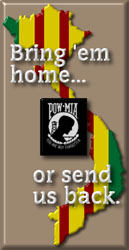Would you like to make this site your homepage? It's fast and easy...
Yes, Please make this my home page!
PLEASE be PATIENT while this page uploads to your browser!
At the present time, according to the DPMO's list of SE Asia for 18 November 1999, there are 2,043 Vietnam POW/MIAs who remain unaccounted for with 63 of them from Michigan. There have been 540 accounted for, including 14 from Michigan.
While visiting my site or other people's POW/MIA web sites and reading the biographies for the POW/MIAs, you should be aware that ALL data in the statistical area of each biography is based on determination at the time of loss, including rank and status. Since then, some promotions may have occurred and ALL POW/MIAs have been declared legally dead (Presumptive Finding Of Death) or KIA/BNR (Killed in Action/Body not Recovered), including those "last known alive"!!!! These legal determinations/hearings occurred from one year after date of loss up through September, 1994, at which time the "last" P.O.W., Charles E. Shelton, was declared dead.
If a South Korean POW can escape after 45 years of captivity in communist North Korea in August of 1998, it is very possible that some of our very own POW/MIAs are still alive and living in captivity wherever their captors have hidden them, especially since some of the men were at a relatively young age when they became MIA with some now being in their 50's and 60's if still alive. We owe it to them to do whatever we can to force and ensure that our government seeks their release and brings them back home where they belong. And for those POW/MIAs who were killed or died while in captivity and whose remains are yet to be recovered, we owe it to them to have their remains brought back home so that their families and friends may have a sense of closure in knowing that their loved ones have finally been brought back home.
Please do whatever you can to help get our missing POW/MIAs back home where they belong! You can do this in numerous ways, starting by writing/e-mailing/faxing the President, the First Lady, the Vice-President and his wife, as well as your State Senators and Representatives. Be sure to ask them specific questions about what is being done to find and bring home our missing POW/MIAs and what they are doing to help.
I am including some terms, definitions and terminology on this page that I have found at various online sites that have helped me to get a better knowledge of what these things mean when I've encountered them in a POW/MIA biography or a report. I hope these will be helpful to you as well.

Top of Page

| Status Abbreviations and Definitions |
| BB - Killed In Action, Body Not Recovered |
BR - Body Recovered |
| KK - Died In Captivity |
KR - Died In Capitivity, Negotiated Remains Returned |
| MM - Missing |
NR - Negotiated Remains Returned |
| PP - Prisoner |
XX - Presumptive Finding Of Death |
Categories of Degrees of Information -
Enemy knowledge of POW/MIA:
- Category 1, Confirmed knowledge:
- A. Identified by the enemy by name
- B. Identified by reliable sources. Received from releasee/escapee or
- C. Reported by highly reliable intelligence sources
- D. Identified through analysis of all -source intelligence.
- Category 2, Suspect knowledge:
- A. Involved in the same incidents as individuals in Category 1.
- B. Lost in areas or under conditions that they may reasonably be expected to be known by the enemy.
- C. Connected with an incident that was discussed but not identified by name in the enemy news media, or
- D. Probably identified through analysis of all-source intelligence.
- Category 3, Doubtful knowledge:
- This category contains individuals whose loss incident such that it is doubtful that the enemy would have knowledge of the specific individuals. (e.g., aircrews lost over water or remote areas.)
- Category 4, Unknown Knowledge:
- A. Individuals whose time and place of incident are unknown (e.g., aircrews members downed at the unknown locations or ground personnel that were separated from their units at an unknown time or place), and
- B. Who do not meet criteria of categories 1 through 3.
- Category 5, Category unrelated to degree of enemy knowledge.
- A. Individuals whose remains have been determined to be nonrecoverable as
outlined in Department of the Army Technical Manual 10-286, January 1964,
section 39.
Source: Data from Defense Intelligence Agency - January 20, 1982
|
Terminology Related to Hostile Actions
Here are definitions of terms relating to hostile actions. The definitions are based on those established in the Department of Defense Instruction 1300.18 of December 27, 1991; Chapter 76 of Title 10, United States Code; and International Laws and Conventions.
Chapter 76, Title 10, of the United States Code states: "The term
"missing status" means the status of a missing person who is determined to be absent in a category of any of the following:
- Missing:
- A military service member is in a missing (missing) status if not at his duty location due to apparent involuntary reasons as a result of a non-hostile action and his location is not known.
- MIA:
- A military service member is in a missing (missing in action) status if not at his duty location due to apparent involuntary reasons as a result of hostile action and his location is not known.
- Interned:
- A person is in a missing (interned) status if that person has been taken into custody by a non-belligerent foreign power as the result of and for reasons arising out of any armed conflict in which the United States is engaged.
- Captured:
- A person is in a missing (captured) status if he has been seized as the result of action of an unfriendly military or paramilitary force in a foreign country.
- Beleaguered:
- A person is in a missing (beleaguered) status if a member of an organized element has been surrounded by a hostile force to prevent escape of its members.
- Besieged:
- A person is in a missing (besieged) status if a member of an organized element has been surrounded by a hostile force for the purpose of compelling it to surrender.
- Detained:
- A person is in a missing (detained) status if prevented from proceeding or restrained in custody for alleged violation of international law or other reason claimed by the organization or group under which the person is being held.
The following definitions are based on international laws and conventions:
- Illegal Detainee:
- A person is an illegal detainee if prevented from proceeding or restrained in custody for alleged violation of international law or other reason claimed by the organization or group under which the person is being held. Detention is illegal if the reason he is being detained is in violation of international law or international agreements.
- Hostage:
- A person held as a pledge that certain terms or agreements will be kept. (The taking of hostages is forbidden under the Geneva Conventions, 1949.)
- Prisoner of War (POW):
- A detained person as defined in Articles 4 and 5 of the Geneva Convention Relative to the Treatment of Prisoners of War of August 12, 1949. In particular, one who, while engaged in combat under orders of his government, is captured by the armed forces of the enemy.
- War Criminal:
- A person is determined to be a war criminal if found guilty of violating international laws and conventions that make up the law of war.
- UN and NATO Provisions:
- United Nations (UN) protections, for UN members serving in a peacekeeping role, are provided for under Chapters 6 and 7 of the United Nations Charter. For example, Captain Scott O'Grady, USAF, was covered as a United Nations expert on mission. As such, the warring parties were required to return him immediately. If held, his status would have been "detainee."
If Captain O'Grady had not been returned immediately, his status would have been "illegal detainee." The protections provided to NATO forces in Bosnia are a result of a "status of forces" agreement signed by the three warring parties as part of the peace accords. NATO is not a party to the conflict. NATO forces are in-country at the request of the warring parties under a status of forces agreement established in the peace treaty negotiated by the United States. Since NATO is not a party to the conflict, NATO forces are not covered by the Geneva conventions pertaining to POWs. The Geneva conventions allow the warring parties in Bosnia to hold a service member of one of the other warring parties in a POW status until the end of hostilities. The status of forces agreement in Bosnia requires all parties to return immediately NATO forces members who come under their control, while according them the same level of treatment required for a POW under the Geneva conventions. |
Top of Page

Web page design and some graphics by Cheryl.
Background and some graphics copyright and courtesy of Papagei Studios

Other graphics copyright and courtesy of Wishmaker's Kingdom and Ron's Free Military & Patriotic Graphics.
MIA/POW Flag Email Stamp Icon graphic courtesy of The American War Library.
Animated guestbook courtesy of Mike Shaikun's Animated Gif Collection.
Web page space courtesy of 50megs.com.
Guestbook courtesy of TheGuestBook.com.





